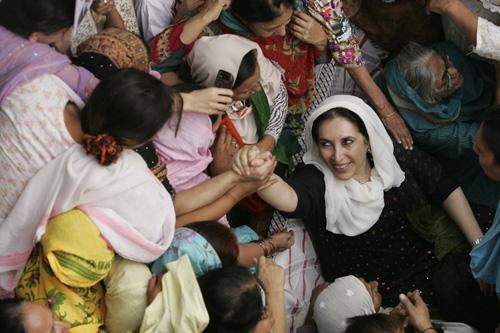Bhutto under house arrest for second time

Opposition leader Benazir Bhutto is welcome as she visits with a mother who lost her son in the Oct. 18 bombing in Karachi while on a tour in Lahore, Pakistan, Monday, Nov. 12, 2007. Bhutto arrived in Lahore Sunday to prepare for a planned massive three-d The Associated Press, Wally Santana
Nov 13, 2007
Last updated on May 12, 2016 at 06:41 p.m.
LAHORE, Pakistan – Opposition leader Benazir Bhutto was placed under house arrest for the second time in four days to prevent her staging a march on Tuesday to protest emergency rule, police said. A close aide to the former prime minister said she would try to lead the 185-mile procession anyway.
The showdown intensified the political crisis engulfing Pakistan and further clouded the prospect of a pro-U.S. alliance against rising Islamic extremism forming between Bhutto and President Gen. Pervez Musharraf.
Bhutto’s aide, Sen. Safdar Abbasi, said the seven-day detention order was not binding because neither Bhutto nor one of her representatives had been served with the document.
“We will go ahead with the march,” he told The Associated Press.
Get The Daily Illini in your inbox!
Aftab Cheema, the chief of operations of Lahore city police, told the AP that a Bhutto representative had received the order issued by the government of Punjab province, where Bhutto has been staying at the house of a lawmaker from her party.
“She has been detained and she won’t be allowed to come out,” Cheema said.
He said about 600 police had been deployed around the house in Lahore and additional forces could be sent later Tuesday, when Bhutto was due to commence her procession to the capital, Islamabad.
A series of three steel-and-barbed wire barricades were erected around the house Monday and sharpshooters took up positions on surrounding rooftops.
The protest caravan was intended to pressure Musharraf to end the state of emergency he imposed on Nov. 3 and give up his post as army chief. It had been expected to take about three days, and Bhutto’s party said thousands of supporters were expected to join en route.
Police said they had ramped up security around Bhutto due to intelligence that a suicide bomber was planning to attack her in Lahore. Ayaz Salim, a top police official, said officers had searched all the city’s hotels after receiving a tip that a suicide bomber was staying in one, but they did not find the suspect.
Bhutto was targeted by an Oct. 18 suicide bombing attack on a homecoming procession in the southern city of Karachi as she returned from years in exile. The assassination attempt killed 145 other people.
She was placed under house arrest in Islamabad Friday to prevent her from addressing a rally in the nearby garrison city of Rawalpindi, where authorities also warned they had intelligence that suicide bombers were loose in the area.
With an escort of dozens of police vehicles, Bhutto ventured out around Lahore Monday to offer prayers at the grave of Pakistan’s national poet, Allama Iqbal, and declared to reporters that her caravan was part of her campaign “to save Pakistan.”
“I know it is dangerous but what alternative is there when the country is in danger?” the former prime minister said.
With Musharraf losing popularity due to growing disaffection in Pakistan over enduring military rule, the Bush administration has backed talks about power-sharing between him and Bhutto as a way to keep the U.S. in control of the nuclear-armed nation where militants are orchestrating attacks inside the country, across the border in Afghanistan.
Foreign Ministry spokesman Mohammed Sadiq said Monday that Pakistan’s nuclear weapons were secure and that there was no risk they would be seized by Taliban or al-Qaida-linked militants who have expanded their influence beyond northwestern border regions.
“There are multiple layers of command and control and the weapons are not in danger of falling into any hands,” he said. “Pakistan’s nuclear program is very well-guarded.”
Musharraf has set no time limit on the emergency declaration, which has resulted in the arrests of thousands of his critics, a ban on rallies and the blacking out of independent TV networks.
Associated Press writer Matthew Pennington contributed to this report





